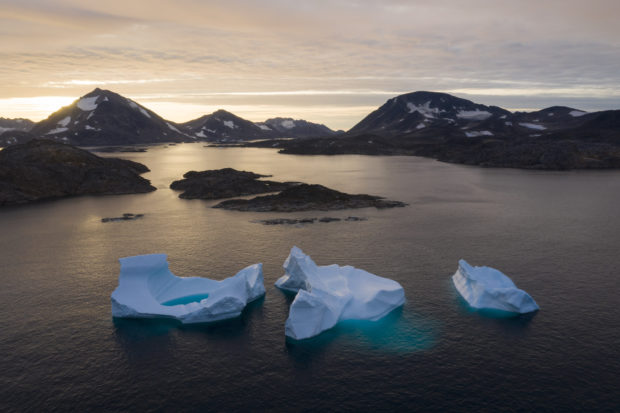
In this Aug. 16, 2019, photo, large Icebergs float away as the sun rises near Kulusuk, Greenland. The Trump administration is poised to announce an expanded diplomatic presence in Greenland and a new assistance package for the vast island aimed at thwarting growing Chinese and Russian influence in the Arctic. The announcement, expected Thursday, April 23, 2020, will come less than a year after President Donald Trump drew derision for expressing an interest in buying Greenland. (AP Photo/Felipe Dana, File)
COPENHAGEN, Denmark — Greenlanders said Thursday they welcome reports that the United States wants to invest in their island, but the money has to come without conditions.
The U.S administration is expected to announce the opening of a U.S. Agency for International Development office at the new American consulate in the capital, Nuuk, and at least $12 million in new aid projects.
The announcement, expected Thursday in Washington, will come less than a year after President Donald Trump drew derision for expressing an interest in buying Greenland, which is part of the Danish Realm. Already, suggestions of a greater U.S. presence in Greenland have been met with criticism in Greenland and in Denmark.
Aaja Chemnitz Larsen from the left-leaning IA opposition party called it a “charm offensive.”
“The Americans are welcome if they want to invest in Greenland,” she told The Associated Press. “But it is important to make sure that Greenland doesn’t owe anything back to the United States. We are skeptical about what they really want besides influence.”
She added that it must clear “what the money should be spent on.”
Jon Rahbek-Clemmensen, an associate professor with the Royal Danish Defense College in Copenhagen, said the United States has been missing out on its Arctic strategy, giving Russia and China a head-start in the Arctic, and is now coming back with a large sum of money.
“The United States has been caught napping and not seen Russia strengthening its military presence in the Arctic and China trying to make investments in Greenland,” he said. “They are now trying to get back at having a presence in the Arctic” and they are doing it “with a big fanfare.”
An op-ed earlier this week by the American ambassador to Denmark, Carla Sands, previewed the announcement and said the U.S. would be “the preferred partner in the Arctic.” That sparked harsh reactions in Denmark.
“They have clearly crossed the line,” said Carsten Hoenge, an outspoken member of the left-leaning Socialist People’s Party that supports the Social Democratic minority government. We must draw a line in the ice cap.”
Soeren Espersen of the opposition Danish People’s Party told Danish broadcaster DR that financial aid “is something you say about third world countries when you provide development aid. But Greenland is not a developing country. It is a Western democracy. I think it’s reprehensible.”
Greenland covers 2.166 million square kilometers (836,000 square miles) but has a population of only 56,000, mainly Inuits.
Last August, Trump’s desire to buy Greenland emerged in press reports in Washington. Inuit Premier Kim Kielsen said then that the island was not for sale, adding: “Greenland is not Danish. Greenland is Greenlandic. I persistently hope that this is not something that is seriously meant.”
Retreating ice could uncover potential oil and mineral resources in Greenland which, if successfully tapped, could dramatically change the island’s fortunes. But no oil has yet been found in Greenlandic waters and 80% of the island is covered by an ice sheet that is up to 3 kilometers (2 miles) thick, which means exploration is only possible in coastal regions.
Even there, conditions are far from ideal, due to the long winter with frozen ports, 24-hour darkness, and temperatures regularly dropping below minus 20 Fahrenheit (minus 30 Celsius) in the northern parts.